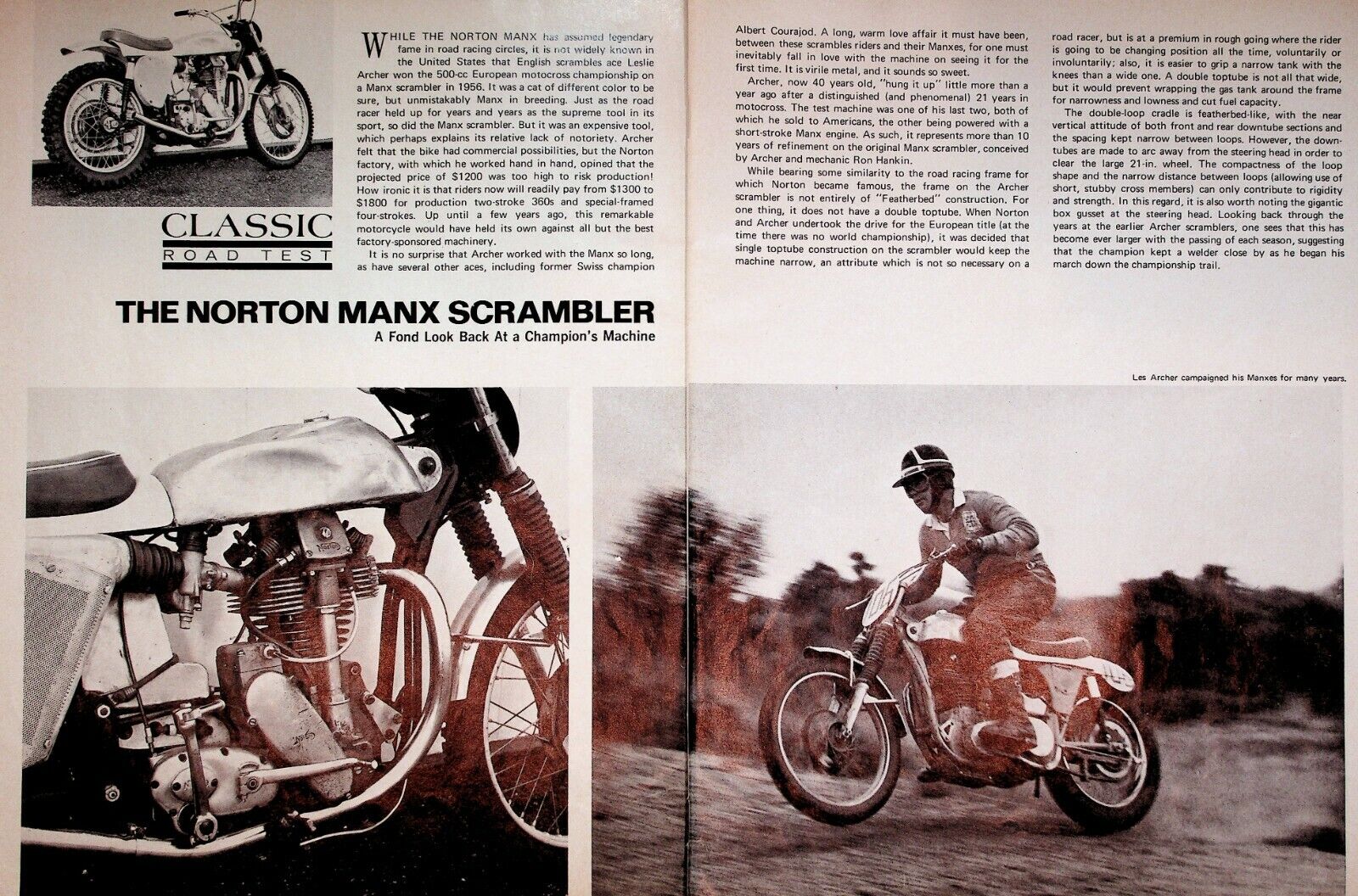-40%
1969 Article: Norton Manx Scrambler - 4-Page Vintage Motorcycle Road Test
$ 6.5
- Description
- Size Guide
Description
1969 Article: Norton Manx Scrambler - 4-Page Vintage Motorcycle Road TestOriginal, vintage magazine article
Page Size: Approx. 8" x 11" (21 cm x 28 cm) each page
Condition: Good
THE NORTON MANX SCRAMBLER
A Fond Look Back At a Champion’s Machine
WHILE THE NORTON MANX has assumed legendary
fame in road racing circles, it is not widely known in
the United States that English scrambles ace Leslie
Archer won the 500-cc European motocross championship on
a Manx scrambler in 1956. It was a cat of different color to be
sure, but unmistakably Manx in breeding. Just as the road
racer held up for years and years as the supreme tool in its
sport, so did the Manx scrambler. But it was an expensive tool,
which perhaps explains its relative lack of notoriety. Archer
felt that the bike had commercial possibilities, but the Norton
factory, with which he worked hand in hand, opined that the
projected price of 00 was too high to risk production!
How ironic it is that riders now will readily pay from 00 to
00 for production two-stroke 360s and special-framed
four-strokes. Up until a few years ago, this remarkable
motorcycle would have held its own against all but the best
factory-sponsored machinery.
It is no surprise that Archer worked with the Manx so long,
as have several other aces, including former Swiss champion
Albert Courajod. A long, warm love affair it must have been,
between these scrambles riders and their Manxes, for one must
inevitably fall in love with the machine on seeing it for the
first time. It is virile metal, and it sounds so sweet.
Archer, now 40 years old, "hung it up" little more than a
year ago after a distinguished (and phenomenal) 21 years in
motocross. The test machine was one of his last two, both of
which he sold to Americans, the other being powered with a
short-stroke Manx engine. As such, it represents more than 10
years of refinement on the original Manx scrambler, conceived
by Archer and mechanic Ron Hankin.
While bearing some similarity to the road racing frame for
which Norton became famous, the frame on the Archer
scrambler is not entirely of "Featherbed" construction. For
one thing, it does not have a double toptube. When Norton
and Archer undertook the drive for the European title (at the
time there was no world championship), it was decided that
single toptube construction on the scrambler would keep the
machine narrow, an attribute which is not so necessary on a
road racer, but is at a premium in rough going where the rider
is going to be changing position all the time, voluntarily or
involuntarily; also, it is easier to grip a narrow tank with the
knees than a wide one. A double toptube is not all that wide,
but it would prevent wrapping the gas tank around the frame
for narrowness and lowness and cut fuel capacity.
The double-loop cradle is featherbed-like, with the near
vertical attitude of both front and rear downtube sections and
the spacing kept narrow between loops. However, the down-
tubes are made to arc away from the steering head in order to
clear the large 21-in. wheel. The compactness of the loop
shape and the narrow distance between loops (allowing use of
short, stubby cross members) can only contribute to rigidity
and strength. In this regard, it is also worth noting the gigantic
box gusset at the steering head. Looking back through the
years at the earlier Archer scramblers, one sees that this has
become ever larger with the passing of each season, suggesting
that the champion kept a welder close by as he began his
march down the championship trail.
12689-70rta-08


